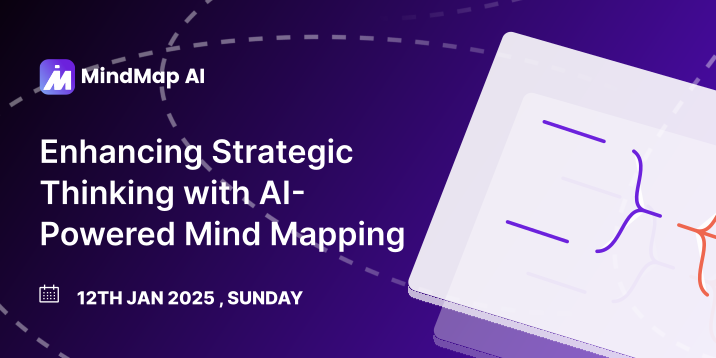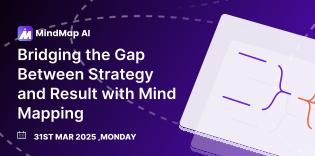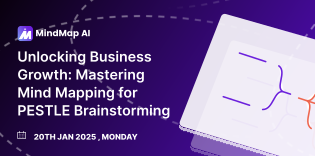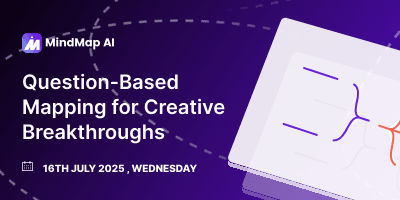
In this webinar hosted by MindMap AI, Tuba Kızılkan, Mind-Mapping Expert, Researcher, and Educator, demonstrated how strategic thinking becomes clearer and more actionable when supported by AI-driven mind maps. With nearly 25 years of teaching and facilitation experience, Tuba walked participants through live examples showing how mind maps can structure ideas, connect insights, and support better decisions.
Drawing on her expertise in linguistics, project management, and innovative teaching methods, she illustrated how professionals in business, HR, marketing, and education can harness AI-powered mind mapping to brainstorm effectively, manage risks, and align resources with organizational goals. Tuba highlighted how MindMap AI helps individuals and teams move from scattered thoughts to structured strategies, bridging the gap between ideas and execution.
Why Strategic Thinking Matters
-
Anticipates challenges and identifies opportunities in a fast-changing world.
-
Align resources with long- and short-term objectives.
-
Drives innovation and competitive advantage.
-
Improves decision-making by clarifying the bigger picture.
-
Supports resilience by adapting to uncertainty and change.
Common Challenges in Strategic Brainstorming
-
Sessions lose momentum without a visual structure.
-
Critical factors are overlooked in fast-paced discussions.
-
Insights remain abstract, failing to translate into clear plans.
-
Teams struggle to connect short-term actions with long-term strategy.
How MindMap AI Supports Strategic Thinking
-
AI Co-Pilot Chat: Generates, refines, and expands ideas in real time.
-
Interactive Mapping: Visualize complex strategies in one evolving map.
-
Industry Context: Adapt insights to HR, marketing, project management, and more.
-
Collaboration Features: Share maps, spark input, and inspire new versions.
-
Actionable Outcomes: Turn brainstorming into templates, plans, and measurable milestones.
What Goes Into Effective Strategic Mind Mapping?
-
Vision: Clarify organizational goals and desired outcomes.
-
Scenarios: Map “what-if” risks and opportunities.
-
Resources: Identify people, time, and budget constraints.
-
Processes: Break down projects into clear stages and tasks.
-
Feedback Loops: Build systems for monitoring and adjusting.
Key Takeaways from Tuba’s Webinar
1. Structure Unlocks Strategy
Mind maps give discussions flow and direction. Tuba showed how AI keeps sessions productive, ensuring that nothing gets lost. This structured approach helps teams stay aligned from start to finish.
2. Balance AI and Human Insight
AI speeds up ideation and expansion, but true strategic value comes from combining technology with human creativity and judgment. The balance allows businesses to innovate faster while keeping solutions practical.
3. From Ideas to Action
Every map should point toward next steps. Tuba emphasized using action nodes and symbols to translate insights into execution. This ensures brainstorming leads to measurable outcomes instead of abstract notes.
4. Collaboration is Critical
Brainstorming thrives when shared. MindMap AI’s collaboration features make it easy to build strategies as a team, even across industries and time zones. Shared maps improve understanding and collective ownership of goals.
5. Reusable Maps
Strategic thinking improves with consistency. Templates for HR, project management, and marketing can be customized and reused for future planning. This creates a repeatable process that saves time while ensuring quality.
Frequently Asked Questions (FAQ)
Why is strategic thinking essential for professionals?
Strategic thinking helps individuals and organizations anticipate risks, seize opportunities, and align resources for long-term success. It enables leaders to stay ahead of change and adapt with confidence.
How does mind mapping improve strategic planning?
Mind maps make complex strategies visual, structured, and interactive, ensuring better collaboration and execution. They also make it easier to identify gaps and connect high-level vision with detailed steps.
Can MindMap AI be used across industries?
Yes. Tuba demonstrated use cases in project management, HR, risk planning, and marketing, showing its versatility for different fields. Whatever the context, the tool adapts to support diverse workflows.
What role does AI play in brainstorming sessions?
AI accelerates idea generation, organizes thoughts, and expands details instantly, allowing participants to focus on creativity and strategy. It ensures no insight is missed while reducing the manual effort of facilitation.










